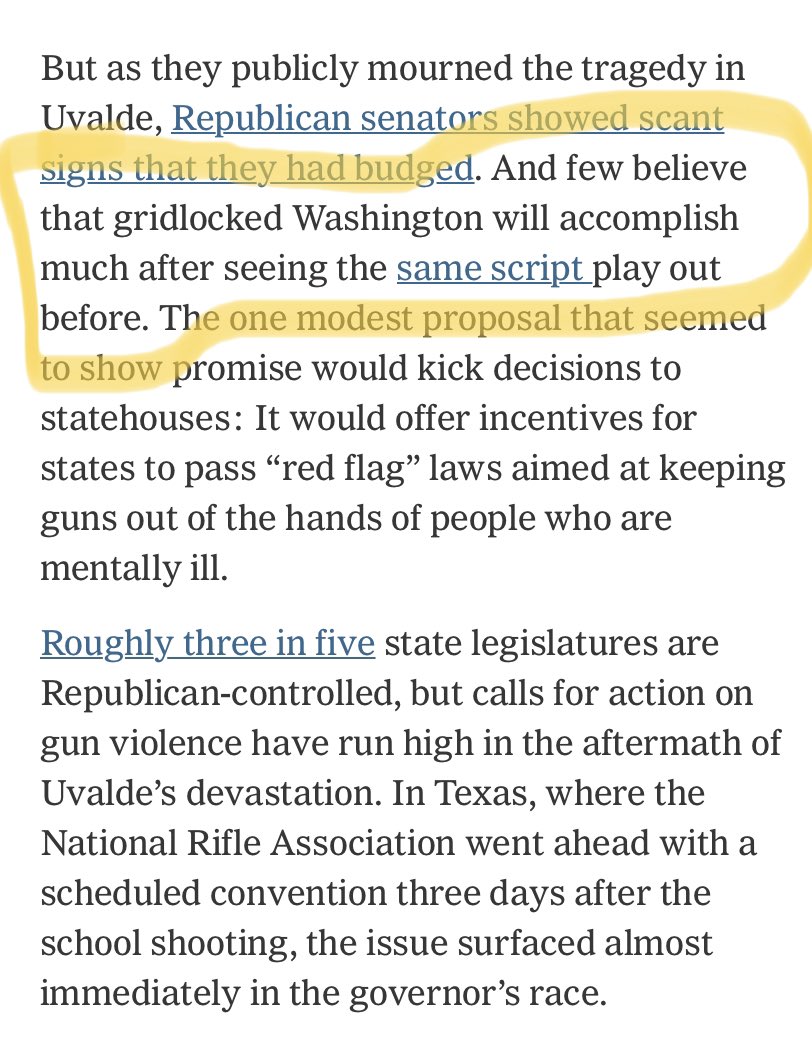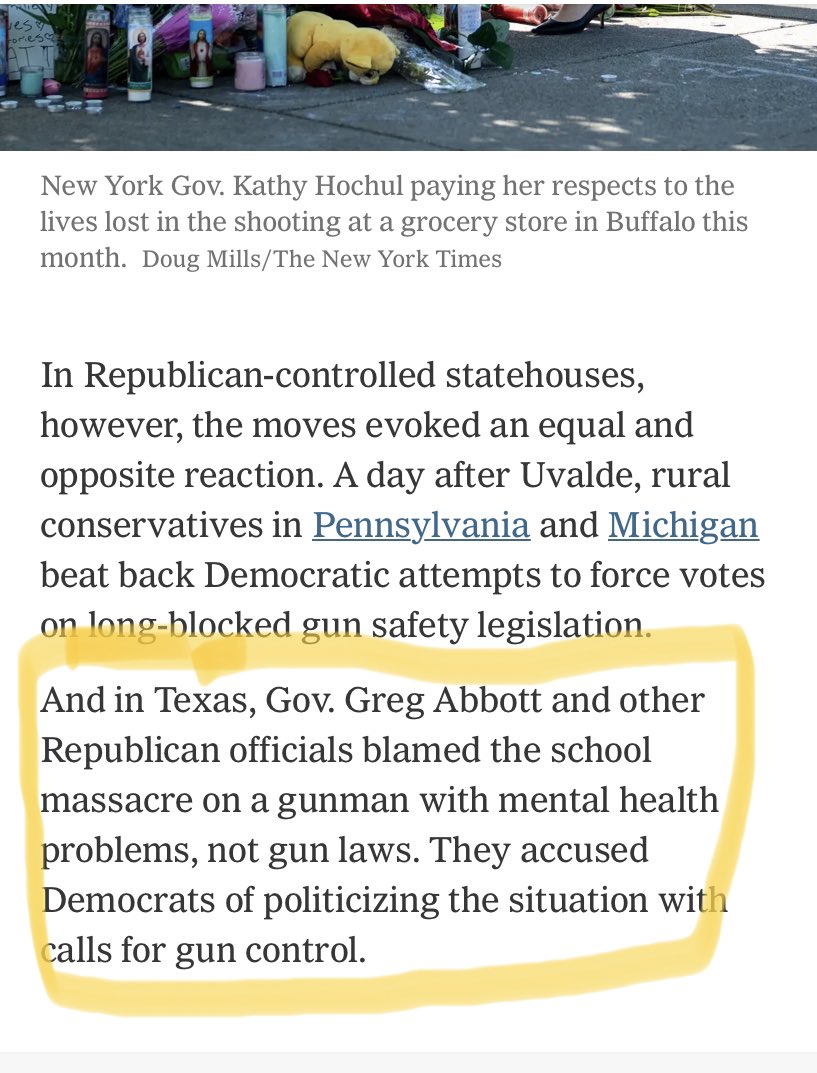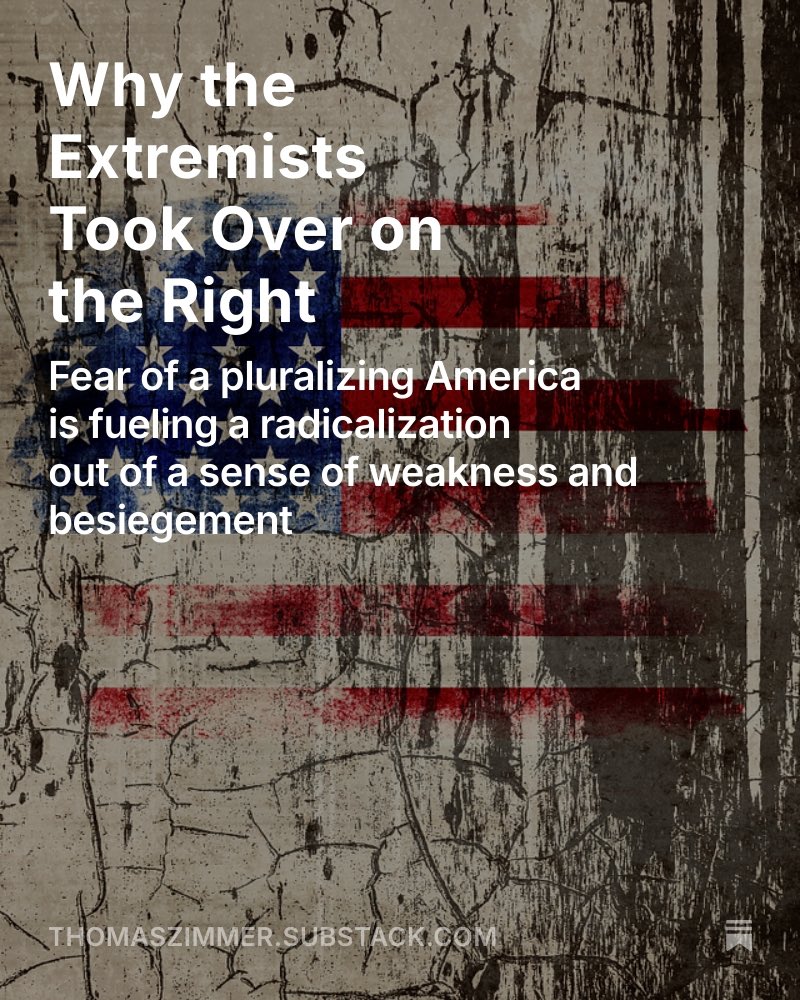This perfectly captures the state of the political discourse on the Right.
It’s a massive problem that much of the established media will keep pretending these are serious people because they feel the need to uphold the myth that there are two roughly equivalent sides/parties.
It’s a massive problem that much of the established media will keep pretending these are serious people because they feel the need to uphold the myth that there are two roughly equivalent sides/parties.
https://twitter.com/patrickdmarley/status/1530141996979044354
Since mainstream journalism is predicated on the idea that politics is a game between two teams that are essentially the same and journalists aspire to “neutrality,” which they define as equidistance from either side, whatever comes from the GOP has to be elevated to credibility.
Stating clearly what the Republican Party has become would run counter to mainstream journalism’s eternal quest for “neutrality” and “balanced” coverage, its overwhelming desire to signal “nonpartisanship.” And so the GOP continues to be covered as if it were a “normal” party.
Occasionally, something so terrible happens that it has enough of an impact to break through this “both sides” charade of constant normalization. Uvalde was such an event. And so we’re getting editorials telling us clearly what the problem is: The radicalization of the Right.
But it never lasts. We’ll be back to pretending the GOP is a “normal” party soon. It’s also weirdly inconsequential for other areas of public policy: Republicans can thoroughly debase themselves on gun violence - and will still be treated as serious voices on taxes, welfare, etc.
And so journalists, forcing themselves to act as if they were completely oblivious to who they are interviewing, will keep approaching them with a microphone to spout their vile nonsense into, as if they hadn’t proven a million times they weren’t serious people.
It’s one of the most bizarre features of the American political discourse that it demands we pretend these are serious suggestions, coming from serious political actors, instead of acknowledging that one side, one party, is entirely uninterested in protecting American lives.
In a healthy political culture, anyone trafficking in such deranged nonsense would be shunned and ostracized, the party that elevates them would have to pay a hefty political price.
In the U.S., that’s evidently not the case. And until that changes, nothing changes.
In the U.S., that’s evidently not the case. And until that changes, nothing changes.
Addendum: In case anyone needed more evidence for the type of mainstream media complicity I am criticizing here, the NYT has this to offer.
This type of coverage is actively harmful and serves no journalistic purpose beyond upholding the “neutrality” dogma. It needs to stop.
This type of coverage is actively harmful and serves no journalistic purpose beyond upholding the “neutrality” dogma. It needs to stop.
https://twitter.com/larryglickman/status/1530344985748459522
The constant normalization of Republican radicalism via supposedly “balanced” journalism is usually most apparent in opinion pieces that explicitly employ a “both sides” framing – but in some ways, it’s the supposedly “neutral” reporting that does more harm. Here’s an example: 

It starts with the headline that defines the problem as “gridlock” in Congress – a term that appears several times in the piece. And in a narrow sense, that’s factually correct. But it’s a framing that privileges those who simply sabotage over those who want solutions. 



The “dysfunction” trope is, in almost all cases, willfully obtuse and entirely misleading. Is there no level of deliberate sabotage from Republicans that political journalists won’t immediately press into the all-familiar “Dysfunction in Washington” framework?
There’s a long bipartisan tradition of blaming “Washington,” of course. But actively sabotaging government and then selling the ensuing dysfunction as proof that government doesn’t work - that’s really been a Republican specialty for decades, with disastrous consequences.
Next up, we get the usual dose of stenography-masquerading-as-journalism: Yes, it’s true, Republicans want to frame it all as a mental health issue and blame Democrats for “politicizing” the situation – but do we need the NYT to present this without any kind of disclaimer? 

What’s the least controversial thing one can do in American politics? Blame “polarization”: It’s the concept you use if you want to lament major problems in American politics but can’t bring yourself to openly address the fact that the actual issue really is a radicalizing Right. 

This one is particularly bad: Why sanitize the utterly deranged, entirely-detached-from-empirical-reality nonsense that Republicans have been offering by presenting it as a call to improve “school security and mental health”? 

“There remain serious questions,” the article reminds us – which makes it sound like someone offered a new, yet to be tested, maybe potentially risky but also kind of innovative approach that just hasn’t been fully vetted yet… Is that what Republicans have been doing? 

The article finally links the gun debate to the broader political conflict. Unfortunately, we’re being treated to some hardcore both sides-ing. Yes, Republican states have been up to some pretty extreme stuff – but did you know that Democrats have decided “to respond in kind”? 

Once again, on a narrowly factual level, it is not incorrect to say that California wants to use the questionable (that’s a euphemism) legal mechanism pioneered by Texas to abolish abortion to enforce its existing gun laws. But think about what’s implied here by this framing. 

What is strongly implied here – fully in line with the overall “polarization” framework – is that both sides are engaged in an equally bad, ever-radicalizing, dangerously escalating project to force their radical views and policies onto America.
That’s only plausible, however, if you think that Texas (abolishing the right to abortion, bodily autonomy, and privacy) and California (enforcing existing gun laws to keep *already banned* guns off the street) are somehow pursuing projects that are morally and politically equal.
One state, Texas, is pursuing a policy uniquely extreme in the “developed” world – while the other, California, is enforcing gun laws that are fully in line with what is consensus everywhere outside the United States of America. That seems like relevant context, perhaps?
I am not singling out this article because it is so extraordinarily bad – but because it’s typical of what is presented as “balanced” coverage every day. It’s the result of journalists following an ethos of “neutrality,” which they define as keeping equidistance from either side.
The “neutrality” dogma and the overwhelming desire to signal “nonpartisanship” have journalists gravitate towards narratives and frameworks that blame “division,” “polarization,” lack of “unity” – while never adequately and precisely assessing the problem.
The resulting coverage constantly privileges the radicalizing rightwing forces in American life. The cumulative effect of this kind of journalism is disastrous. So many Americans remain oblivious to the threat of Republican radicalization – and this is a big reason why.
• • •
Missing some Tweet in this thread? You can try to
force a refresh






